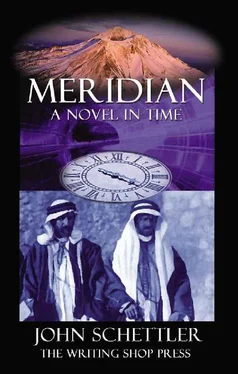Paul looked at him, unwilling to speak, but he could see that it would only be a matter of time if he resisted this man’s questions—and very painful time at that. He resolved to answer him, hoping to thread his way through the interrogation without saying anything too damaging. Perhaps he could plead that he was a non-combatant and invoke the Geneva convention as a shield. Then he realized that the convention had not even been adopted until well after this war. He would be at the mercy of this man, no matter what he decided.
“I am an American,” he began cautiously, “a writer.”
The Colonel eyed him with suspicion. “You are wearing a British uniform.”
“It was necessary,” said Paul. “The British insisted.”
“They insisted? How very much like them.” The Colonel stood up, leaning close to Paul and studying his face and hands. “You are not a soldier,” he concluded. “That much is clear. Yet it does not take a soldier to be a spy. Why are you here?” The tone of his voice made it evident to Paul that he was not convinced. “Are you trying to make the world safe for democracy, as your President Wilson has said? There are no Americans in this region. Speak!”
“No, I am not a soldier—only a writer. My government does not know I am here.”
“Oh? And what do you think you will see here? There is nothing here but the desert, unless, of course, you are interested in our trains. The battle is a hundred miles from this place. I think you are a spy.”
“I am not a spy, I write books, that’s all. You can see that I am unarmed.”
The Colonel regarded him in silence, his cigarette building a long ash as it burned. He took another drag, his eyes narrowing above the red glow of the cigarette tip in the darkness of the room.
Paul hoped the man could see that he was not a soldier. Can’t he tell by my accent that I’m not English? He probably thinks I was sent here by the British, though, and he’ll want to get at the reason soon enough.
“You know I can have you shot without a second thought for concealing that British uniform beneath these robes. Who do you think you are fooling?”
Paul did not answer.
“Yes, you are fooling no one. The British are fools, just as you are to come here. Perhaps you are one of the men the British have sent to incite these Arabs, yes? You were wandering near the rail lines, and the Arabs have been a nuisance. I think you were planning some mischief here, American. Yes—you are an American. I can make mischief as well.” The warning in his eyes was apparent.
His cigarette burned down to a nub and he let it fall to the floor, grinding the ash under his boot. “Perhaps,” he said, “I should give you something to write about. How did you come here?” The question was hard, whip like, and laden with the implication of a threat.
Paul had to think fast. He needed a credible story, and his mind scoured through memories of the history to come up with something plausible. “I wanted to write,” he said haltingly. “Yes, I had to come in through a British controlled port, but my luggage was mishandled and I was given British kit in compensation.”
“What port?” The question was sudden and sharp.
“Cairo… And I came across Suez to try and reach the front.”
“Oh? Where is the front?”
Paul searched his recollection, desperate for a credible answer. He could quote chapter and verse when it came to events in the Second World War, but he had not given much study to the first. He equivocated. “With Allenby,” he said, buying time.
“Allenby, yes I suppose there is a front here now, thanks to him. He had a surprise for us at Beersheba last week. He stole around our flank with his horse soldiers. He wants Jerusalem, but we will not give it to him so easily. Still, this does not explain your presence here.”
“As I said,” Paul continued. “I came in through British lines, but I do not answer to them. I am here on my own. I write books, that is all—history books. I merely wished to see the war for myself. They would not give me permission to come here to the desert, but I snuck away, concealed in these Arab robes.”
“You think me a fool? You come wandering through the night in the middle of a rain storm to study for your books? I do not believe you. I think you are watching the movements of our trains, and that you would tell everything you see here to the British if you could. Yes?”
“I ran into trouble with the locals,” Paul groped for some way out of the situation. “I had to flee for my life. I knew there was a railroad to the west and so I started walking, hoping to find my way.”
“Where? To Amman? To Damascus? You are very far from both for a man with only his two legs to take him about. Did you think you could beg passage on one of our trains—dressed like that?”
The Colonel moved suddenly, striking Paul hard on the cheek with the back of his hand. Paul winced with the blow, wondering if it would not have been better to just keep silent.
“That is for lying to me,” the Colonel said in a low voice. “The rest you will get in a moment or two. But first, I must assure myself that the tracks are clear ahead and that no other writers and reporters are lurking in the night.”
He gave Paul a derisive glance and strode to the doorway, pulling it open and shouting orders at the guards outside his coach in Turkish. The men ran to respond, their boots crunching on the gravel bed of the rail line, receding into the distance as they went.
“Now,” said the Colonel, turning back to Paul. “We are quite alone.”
Paul did not like the sound of that, and was afraid that the man was going to strike him again—or worse. Perhaps he wanted to get rid of any witnesses, or perhaps he merely wished to savor the rest of his interrogation with some aberrant sense of privacy. Thankfully, the Colonel sat down at his desk, eying the coffee bag and taking it up to sample the aroma again.
“Very good,” he said hefting the bag in his hand. “I have been missing my coffee for three nights now, so I will light an oil stove and try your beans before we continue. Perhaps,” he finished with a hint of sarcasm in his voice, “it will lighten my mood.” The smile the Colonel flashed at him gave Paul little comfort.
He was some time, lighting a small oil stove and pouring water from a canteen into a dented tin pot. He took a moment to inspect Paul’s mess kit more closely, coming to silent conclusions about what he saw there, but saying nothing. Paul wondered how it was that the man spoke English. He chanced a question, knowing that he invited another sharp rebuke, but hoping to strike some accord with the man if he could.
“You speak English very well,” he flattered. “Were you educated in the West?”
The Colonel looked at him as though he had been interrupted by a discordant noise. But his eyes softened a bit and he answered. “Educated? I have been educated in many places. One must know his enemy if he is to fight him. Are you surprised I speak your language? Most British are when I first address them. Oh, the fun is in listening first, of course; listening to their idle chatter when they think me nothing more than an ignorant Muslim. The arrogance of the British is well known. They believe the rest of the world is here for their pleasure, and they have set themselves to meddling in the affairs of men in every quarter of the globe. They will learn. We will teach them.”
The Colonel seemed to delight in lecturing Paul now, who was clearly a captive audience. “I suppose it was inevitable that we would end up fighting the British one day. I think the Young Turks have found war with England more to their liking. With the Russians things did not go so well. That was Enver Pasha’s fault. He was worried about the Armenians again, and the Caucasus. The British were building two ships for the Sultan’s Navy, but Mr. Churchill thought better of giving them to us when they were finished. I think he knew we must fight one day as well. It is a pity that Enver Pasha did not know it. The Germans were only too eager to give us ships, and he used them to shell the Russian base at Odessa so he could have his little war with the Russians. He thought he would become a general, you see, though he had never even commanded as much as a regiment before. When the Russians declared war on us he had a fatwa read to declare a holy war in reprisal. Then he thought to lead our Holy Army of Islam into the Caucasus against the Russians. That did not go so well for us, but the Russians believed they were in danger nonetheless. They begged your English friends to help them, and the British came to attack the Dardanelles. Now we have war on every border.”
Читать дальше












